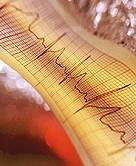- Could Your Grocery Store Meat Be Causing Recurring UTIs?
- Are You Making This Expensive Thermostat Error This Winter?
- Recognizing the Signs of Hypothyroidism
- 10 Strategies to Overcome Insomnia
- Could Artificial Sweeteners Be Aging the Brain Faster?
- Techniques for Soothing Your Nervous System
- Does the Water in Your House Smell Funny? Here’s Why
- Can a Daily Dose of Apple Cider Vinegar Actually Aid Weight Loss?
- 6 Health Beverages That Can Actually Spike Your Blood Sugar
- Treatment Options for Social Anxiety Disorder
Common Irregular Heartbeat May Pose Risks for Surgery Patients


Surgery patients who have the irregular heartbeat known as atrial fibrillation may be at heightened risk of stroke for months after their operation, a new study finds.
Atrial fibrillation affects more than 33 million people worldwide, and doctors have long known that people with the heart rhythm disorder have a three-fold higher risk of stroke.
The new study looked at risks occurring around the time of a surgery, however. The researchers analyzed data from 1.7 million patients in California who had inpatient surgery between 2007 and 2011 and were followed for an average of just over two years.
Of those patients, more than 24,700, or close to 1.5 percent, experienced atrial fibrillation around the time of surgery.
Overall, nearly 14,000 of the patients later suffered an ischemic stroke, which is caused by blocked blood flow to the brain.
According to the researchers, having atrial fibrillation around the time of surgery was tied to a doubling of stroke risk after non-cardiac surgery, and a 30 percent higher risk of stroke after cardiac surgery.
Researchers led by Dr. Gino Gialdini, of Weill Cornell Medical College in New York City, believe the findings may be important for the care of people undergoing surgery, especially for those having operations that are not related to cardiological issues.
Further research is needed to learn more about the link between atrial fibrillation around the time of surgery and increased stroke risk, and the best ways to prevent stroke in these patients, they added.
One expert said the study provides valuable new information.
“This large study suggests that atrial fibrillation occurring during this time may be significant and associated with a real increase in long-term risk of stroke, especially in patients undergoing non-cardiac surgery,” said Dr. Nicholas Skipitaris, director of cardiac electrophysiology and The Heart Rhythm Center at Lenox Hill Heart and Vascular Institute in New York City.
He said the study “has major implications, as patients with [atrial fibrillation] likely warrant closer rhythm monitoring and consideration for anticoagulation to attenuate [lessen] their risk for stroke in the future.”
The study will be published in the Aug. 13 issue of Journal of the American Medical Association.
More information
The U.S. National Library of Medicine has more about atrial fibrillation.
Source: HealthDay
Copyright © 2026 HealthDay. All rights reserved.










